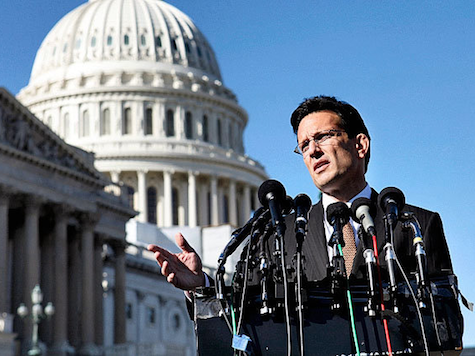Eric Cantor is a man who can say “no” to Obama.
There is perhaps no other congressional leader whom the president dislikes more, for the simple reason that Cantor is prepared to risk the consequences of confrontation.
The Virginia Republican has said “no” on at least two critical occasions–first, as Minority Whip during the stimulus debate in Feburary 2009; and second, as Majority Leader during the debt ceiling talks of 2011.
John Boehner, in contrast, is a deal-maker by nature, and in any other era might have been the perfect Speaker of the House. But Obama is not interested in deals. He is interested in crisis, because crisis provides opportunities to make big changes that would otherwise be rejected.
While Democrats and Republicans alike are grumbling about the terms of the “fiscal cliff” deal, for example, Obama is celebrating what he feels is a political breakthrough: forcing Republicans to acquiesce in higher tax rates.
Whereas President Bill Clinton’s sense of political self-preservation led him to borrow the opposition’s ideas, President Obama–rather admirably–has repeatedly risked his own political survival for the sake of ideological goals.
It is a challenge that Boehner has not been able to tackle–yet one that Cantor has understood from the very beginning.
It’s not that Cantor is a particularly ideological leader. He has proven to be as capable of back-room manipulations as any politician on Capitol Hill.
During the 2012 elections, he irritated conservatives by appearing to back establishment candidates against Tea Party opponents in several primaries, notably in the Indiana race for U.S. Senate. (Cantor also backed Tea Party freshman Adam Kinzinger against veteran Don Manzullo in Illinois.)
What distinguishes Cantor is his appreciation for political opposition as an institution in itself.
In pulling together a dejected House Republican minority in unanimous rejection of Obama’s stimulus, Cantor gave inspiration to the rising Tea Party movement and built the basis for Republican victory the following November.
Cantor was willing to risk criticism from the media, which touted the stimulus as essential to recovery, not just because he knew it was bad policy, but also because he needed to restore the party’s confidence.
During the debt ceiling talks, Cantor refused to accept President Obama’s demands to raise taxes–and eventually, Obama snapped, storming out of a meeting with Cantor and other congressional leaders. The media played the event to Cantor’s disadvantage, but the White House knew the President had lost negotiating leverage by leaving.
The President’s strategy throughout had been to stoke division between Cantor and Speaker Boehner. Obama and Boehner met secretly, circumventing talks between Cantor and Vice President Biden.
As Bob Woodward reported in his book about the debt ceiling talks, The Price of Politics, Obama later teased Boehner: “You know Cantor’s trying to get your job, the president told Boehner. He’s trying to screw you.” (177)
Those divisions rankled throughout the talks, until Cantor’s and Boehner’s staff met to smooth out relations afterward. The split surfaced again this week, when Cantor openly opposed the “fiscal cliff” deal passed by the Senate on New Year’s Day, and which the Speaker allowed to proceed to a vote on the House floor despite evident misgivings.
A large majority of Republicans–nearly 2-to-1–joined Cantor in voting against the bill.
In person, Cantor is affable, and highly polished–perhaps too much so. Occasionally, his stagecraft falls flat.
In the Blair House talks about Obamacare, for instance, Cantor brought the physical bill–thousands of pages in a pile–to the table. Media critics saw the gimmick as petulant–and conservatives remembered the talks less for Cantor’s posturing and more for Paul Ryan’s patient deconstruction of the bill’s accounting.
But Cantor has consistently proven willing to take political gambles. If he is guilty of personal ambition, it is at least an ambition that has lined up with principled stands.
When the Washington commentariat has insisted on the need for a deal–to save the economy, to prevent default, to avoid tax hikes–Cantor has been willing, in Obama’s words, to “call my bluff.”
Increasingly, conservatives are getting tired of folding.

COMMENTS
Please let us know if you're having issues with commenting.